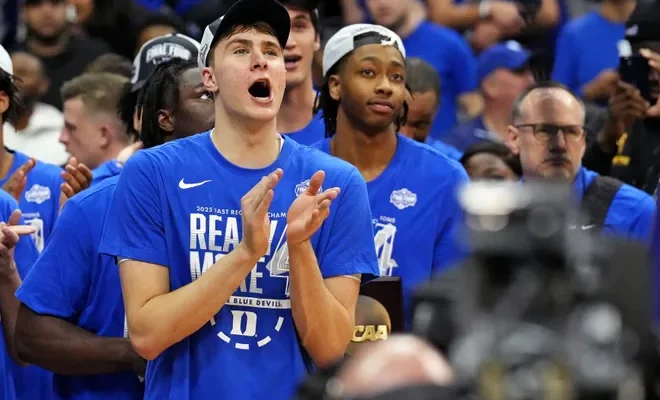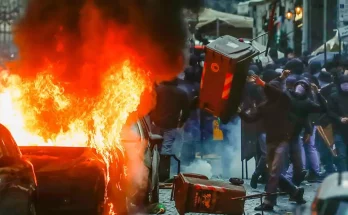The echoes of a triumphant season still linger in the rafters of Cameron Indoor Stadium, but for head coach Jon Scheyer and the Duke Blue Devils, the focus has already shifted to what lies ahead. A new season brings with it new challenges, and perhaps the most significant one for this year’s squad is the need to fill a leadership void left by two of the program’s most recent one-and-done phenoms: Cooper Flagg and Kon Knueppel. Their presence, both on and off the court, was undeniable, and as Scheyer navigates the early stages of fall practice, he is keenly observing which players will rise to the occasion and become the vocal leaders this team desperately needs.
Flagg and Knueppel weren’t just exceptional talents; they were the heartbeat of the team. Their one season at Duke was a masterclass in not only basketball but also in leadership. Flagg, with his preternatural poise and intense competitive fire, led by example. His every move on the court was a declaration of his will to win, a silent but powerful message to his teammates. Knueppel, on the other hand, was the vocal glue. His infectious energy, constant communication, and ability to rally the troops were invaluable. Together, they formed a symbiotic leadership dynamic that propelled the Blue Devils to success. Their departure for the NBA, while expected, leaves a gaping hole that cannot simply be filled by talent alone.
The task now falls to Scheyer to identify and cultivate the next generation of leaders. The early days of fall practice are more than just a time for conditioning and skill development; they are an audition for leadership. Scheyer is watching for who takes charge during drills, who holds their teammates accountable, and who consistently sets the tone with their energy and communication. This isn’t about the box score; it’s about the intangibles that define a championship team.
The candidates for these roles are numerous, and each brings a different set of skills and experiences to the table. The returning players, those who witnessed Flagg and Knueppel’s leadership firsthand, are the most obvious choices. They understand the culture and the expectations of the Duke program. A player like Tyrese Proctor, for example, a veteran guard with significant experience, is a prime candidate. He has been through the wars of the ACC and the NCAA Tournament and has seen what it takes to win at the highest level. His quiet confidence and steady hand could be a powerful force for a young team. His ability to lead by example, much like Flagg, will be crucial.
Another veteran to watch is Caleb Foster.1 His relentless work ethic and competitive spirit could inspire his teammates. Having spent a season learning from the best, he now has the opportunity to put those lessons into practice. His voice, which was once a part of the chorus, must now become a solo. Scheyer will be looking for him to be more vocal, to take control of the offense, and to be a leader on the defensive end.
The frontcourt also presents potential leaders. The returning big men, who battled daily with Flagg and Knueppel in practice, now have the chance to step into a more prominent role. Their experience and physical presence will be vital for a team that will likely rely on a balanced attack. Scheyer is looking for a big man who can not only protect the rim and rebound but also be a vocal anchor on defense, directing traffic and ensuring everyone is in the right position.
But leadership isn’t limited to the veterans. Scheyer’s recruiting classes are consistently filled with top-tier talent, and it’s not uncommon for a freshman to emerge as a leader. The pressure of playing at Duke can either shrink or grow a player, and the ones who thrive are often the ones who embrace the responsibility. Scheyer will be watching his new recruits closely, looking for the one who speaks up, who isn’t afraid to challenge a teammate, and who displays a maturity beyond their years.
The absence of Flagg and Knueppel forces a collective effort, and that’s precisely what Scheyer is hoping to see. He understands that leadership doesn’t have to come from a single player. It can be a committee of voices, each contributing their own unique strengths. The challenge is to get these players to step out of their comfort zones and into these roles. It’s a delicate process of nurturing and encouragement, of pushing players to be more than they thought they could be.
The early fall practices are the proving ground. It’s where the foundation for the season is laid, not just in terms of basketball fundamentals but in terms of team chemistry and leadership. Scheyer’s job is to create an environment where these players feel empowered to speak up and take charge. He’s looking for those moments when a player grabs a teammate by the jersey and tells them to get back on defense, or when a player pulls the team into a huddle and gives a pep talk after a tough drill. These are the moments that reveal a leader.
The Duke program is built on a tradition of excellence, and a huge part of that tradition is the passing of the torch from one generation of leaders to the next. Flagg and Knueppel carried that torch with distinction, and now it’s time for a new group to take it up. The task is a daunting one, but it is also an opportunity for growth and for a new identity to be forged. The early days of fall practice are not just about preparing for the season; they are about discovering who this team will be. And as Scheyer watches his players, he is looking for the ones who will not only score the points and grab the rebounds but also provide the voice and the heart that will define the Duke Blue Devils of the future. The silence left by Flagg and Knueppel will not last long, and the new leaders are already beginning to emerge, one practice at a time.



